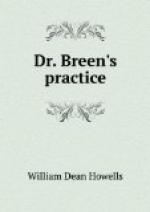It was her fashion to approach any subject upon which she wished her son to talk as if they had already talked of it, and he accepted this convention with a perfect understanding that she thus expressed at once her deference to him and her resolution to speak whether he liked it or not. She had not asked him about Mrs. Maynard’s sickness, or shown any interest in it; but after she learned from the Barlows that she was no longer in danger, she said to her son one morning, before he drove away upon his daily visit, “Is her husband going to stay with her, or is he going back?”
“I don’t know, really,” he answered, glancing at her where she sat erect across the table from him, with her hand on the lid of the coffee-pot, and her eyes downcast; it was the face of silent determination not to be put off, which he knew. “I don’t suppose you care, mother,” he added pleasantly.
“She’s nothing to me,” she assented. “What’s that friend of hers going to do?”
“Which friend?”
“You know. The one that came after you.”
“Oh! Dr. Breen. Yes. What did you think of her?”
“I don’t see why you call her doctor.”
“Oh, I do it out of politeness. Besides, she is one sort of doctor. Little pills,” he added, with an enjoyment of his mother’s grimness on this point.
“I should like to see a daughter of mine pretending to be a doctor,” said Mrs. Mulbridge.
“Then you would n’t like Dr. Breen for a daughter,” returned her son, in the same tone as before.
“She wouldn’t like me for a mother,” Mrs. Mulbridge retorted.
Her son laughed, and helped himself to more baked beans and a fresh slice of rye-and-Indian. He had the homely tastes and the strong digestion of the people from whom he sprung; and he handed his cup to be filled with his mother’s strong coffee in easy defiance of consequences. As he took it back from her he said, “I should like to see you and Mrs. Breen together. You would make a strong team.” He buttered his bread, with another laugh in appreciation of his conceit. “If you happened to pull the same way. If you did n’t, something would break. Mrs. Breen is a lady of powerful convictions. She thinks you ought to be good, and you ought to be very sorry for it, but not so sorry as you ought to be for being happy. I don’t think she has given her daughter any reason to complain on the last score.” He broke into his laugh again, and watched his mother’s frown with interest. “I suspect that she does n’t like me very well. You could meet on common ground there: you don’t like her daughter.”




